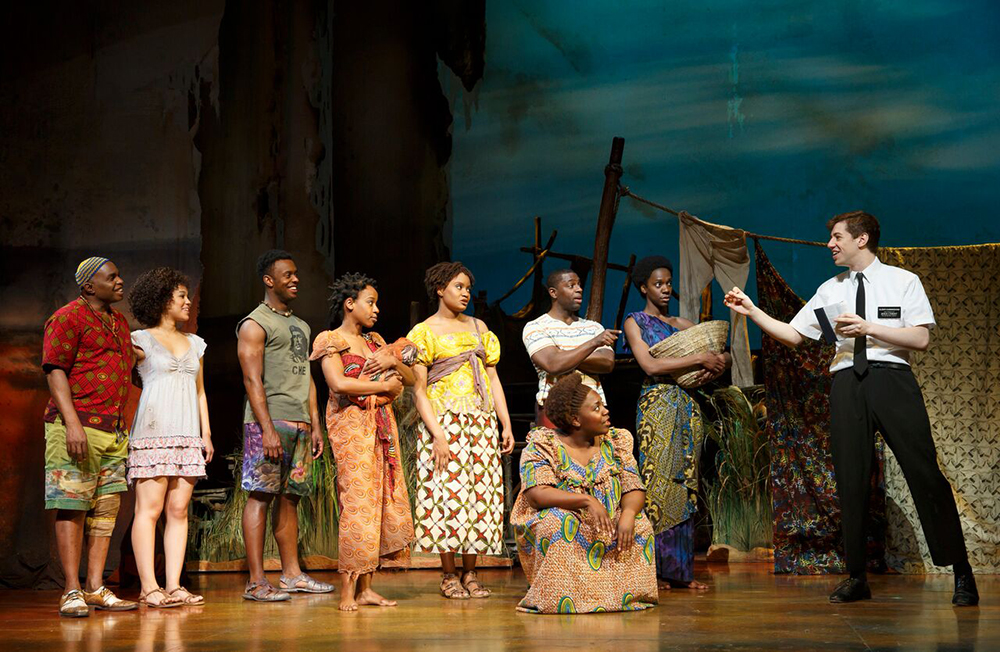Crass, Offensive And Politically Incorrect: Does ‘The Book Of Mormon’ Hold Up In 2018?
Is the Broadway staple really an "equal opportunity offender"?

Since it opened on Broadway in 2011, The Book of Mormon has garnered near-universal praise and commercial success. It’s won nine Tony Awards and grossed over $500 million in ticket sales, joining rank with the likes of The Phantom of the Opera and Les Misérables as one of the most successful musicals of all time. It also banks on being offensive, crass, and politically incorrect.
Last week, the musical opened in Sydney after a year-long sell out debut season in Melbourne. Overseas, the show still plays to packed out theatres daily on both Broadway and London’s West End.
But, whether we like it or not, the world has changed a lot since 2011. We’re now more open, aware, and empathetic to the struggles of marginalised communities, even if that openness is a direct result of much more dire circumstances. Not to mention the fearful reality that a reality TV show host might be the catalyst for the end of the world.
All that in mind, does a musical that lambasts just about everything it can touch hold up in 2018?
“Equal Opportunity Offender”
It goes without saying that a production from the creators of South Park would cause controversy.
When Trey Parker and Matt Stone teamed up with songwriter Robert Lopez (best known today for his Oscar-winning work on Disney’s Frozen) to create The Book Of Mormon back in 2004, some worried that Mormons would heavily protest the musical. Instead, the church was so cool with it they bought out advertising space in the program.
However, the majority of the criticism levelled towards The Book Of Mormon has to do with how it approaches race, not religion.
Most of the musical is set in an impoverished Ugandan village, where a mismatched pair of Utah-raised Mormons are sent for their mandatory two-year evangelical mission. Common racial stereotypes regarding Africa — poverty, warlords and dictators, AIDS, flimsy cult medical practices — are used as a backdrop for the character arcs of the two protagonists, Elders Price and Cunningham.
The Ugandan people are also characterised as dumb and childish: female love interest Nabulungi refers to using a typewriter as “texting”, and female genital mutilation is used to highlight the community’s depravity whilst under the rule of warlord General Buttfuckingnaked.

Upon release, NPR called its characterisation of African communities “cultural colonialism of the most insidious kind,” while a review for Harvard University noted that the Uganda presented in the production looked nothing like the real thing. Compared to the likes of Black Panther or fellow Broadway hit Hamilton, The Book of Mormon certainly feels like a step backwards for pop culture representation.
You could argue that part of The Book of Mormon’s appeal is that it doesn’t beat around the bush: everything is a punchline, because nothing is sacred.
But while it sells itself as an “equal-opportunity offender”, The Book of Mormon does seem to treat organised religion with a lot less scrutiny than you’d expect from a play that literally has ‘Mormon’ in the title. The unease of this thematic gap has been widened recently thanks to everything from the God-fearing Trump administration to the Australian Christian Lobby’s efforts during last year’s marriage equality postal survey. As Slate’s browbeat column points out, “It’s harder to giggle at religion when it’s become a political force to be reckoned with.”
There’s also a discrepancy in The Book of Mormon between the reverence given to the titular Mormons and the Ugandan people. The musical is understanding — even admiring — of Mormonism and organised religion’s potential to unify communities. The Ugandan doctor, meanwhile, is reduced to a running gag about not being able to treat his own genital disease.
So, Should You See It?
It’s worth remembering the medium The Book of Mormon is set in: commercial musical theatre, a world where tickets often cost hundreds of dollars and the audience is overwhelmingly old and white. It’s a bit hard to argue that all targets are equal when the medium is already weighted heavily against minorities.
And yet Book of Mormon is still a great musical, mostly thanks to Robert Lopez’s ability to effortlessly ape other musical styles. Arguably its strongest point (and its best song) is ‘I Am Africa’, a deconstruction of the white saviour narrative via a ‘We Are The World’-style feel-good anthem. This is where the play shines: when creators Parker, Stone, and Lopez recognise that the superficial, racist concept of Africa presented is one that the west has built, resulting in real-world ramifications spanning everything from voluntourism to Bono. Apropos of nothing, it’s also fucking hilarious.
Depending on who you ask, the rest of the musical either does or doesn’t hold up. Whichever side of the fence you fall on, it’s hard to deny that the world’s political climate has changed significantly since the show first opened.
And as a result, Book of Mormon might not be as subversive as it wants you to believe.
—
The Book Of Mormon is now playing at the Sydney Lyric Theatre.
—
Albert Santos is a Sydney writer. You can find them on Twitter here.

